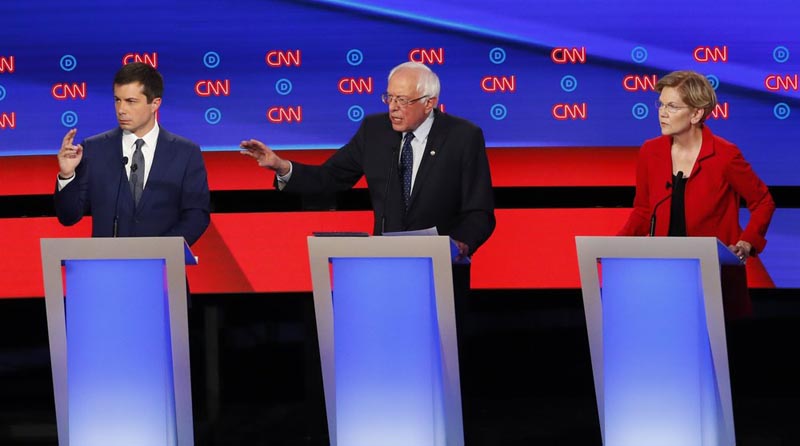Sanders, Warren fight back in support of ‘Medicare for All’
DETROIT: Liberal firebrands Bernie Sanders and Elizabeth Warren slapped back against moderate rivals who ridiculed “Medicare for All” during Tuesday night’s Democratic presidential debate in which lesser-known pragmatists warned that “wish-list economics” would jeopardize the presidency.
The tug-of-war over the future of the party early in the 2020 season pits voters’ hearts against their heads as they balance their desire for an aggressive response to President Donald Trump against finding a safe choice who can win. Over and over, Sanders and Warren insisted on their plans to transform the nation’s economy and health care system make up the core of a winning message.
“I don’t understand why anybody goes to all the trouble of running for president of the United States just to talk about what we really can’t do and shouldn’t fight for,” said Warren, a Massachusetts senator, decrying Democratic “spinelessness.”
Standing at Warren’s side at centre stage, Sanders, a Vermont senator, agreed: “I get a little bit tired of Democrats afraid of big ideas.”
The fight with the political left was the dominant subplot on the first night of the second round of Democratic debates. Twenty candidates are spread evenly over two nights Tuesday and Wednesday. The second night of debates will feature early front-runner Joe Biden, the former vice president, as well as Kamala Harris, a California senator.
While much of the debate was dominated by attacks on Medicare for All, the issue of race emerged in the second hour. The candidates were unified in turning their anger toward Trump for using race as a central theme in his reelection campaign. Sanders said Trump exploited racism and others said the president’s rhetoric revived memories of the worst in the country’s history, including slavery.
“The legacy of slavery and segregation and Jim Crow and suppression is alive and well in every aspect of the economy and the country today,” said former Texas Rep. Beto O’Rourke, adding that he supported the creation of a panel to support reparations for the descendants of slaves.
In many respects, the broader debate is only beginning. The Democratic nomination won’t be secured until the party’s national convention next July in Wisconsin.
Despite the long road ahead, there is an increasing sense of urgency for many candidates who are fighting for survival.
O’Rourke is likely to qualify, even as he tries to stop his sharp slide in the polls. But those, especially at risk among Tuesday’s lineup, include Montana Gov. Steve Bullock and former Colorado Gov. John Hickenlooper, the only governors in the running, and Midwestern natives such as Minnesota Sen. Amy Klobuchar and Ohio Representative Tim Ryan. Also on stage: former Maryland Rep. John Delaney and author and activist Marianne Williamson.
Klobuchar, who is struggling to keep her campaign alive, aligned herself with the struggling pragmatic wing Tuesday night: “We are more worried about winning an argument than winning an election.”
Bullock took a swipe at Sanders: Working people “can’t wait for a revolution,” he charged. “Their problems are here and now.”
But perhaps no issue illustrates the evolving divide within the Democratic Party more than health care.
Sanders’ plan to create a free universal health care system, known as Medicare for All, has become a litmus test for liberal candidates, who have embraced the plan to transform the current health care system despite the political and practical risks. Medicare for All would abandon the private insurance market completely in favour of a taxpayer-funded system that would cover all Americans.
In targeting Medicare for All, the more moderate candidates consistently sought to undermine the signature domestic policy proposal of the top two progressives on the stage, Sanders and Warren. They variously derided Medicare for All as too costly, ineffective and a near-certain way to give Republicans the evidence they needed that Democrats supported socialism.
“They’re running on telling half the country that their health care is illegal,” Delaney said.
“We have a choice: We can go down the road that Sen. Sanders and Sen. Warren want to take us, which is with bad policies like Medicare for All, free everything and impossible promises,” he continued. “It will turn off independent voters and get Trump reelected.”
Yet Sanders and Warren did not back down.
And while they are competing for the same set of liberal voters, there seemed to be no daylight between them Tuesday.
“Health care is a human right, not a privilege. I believe that. I will fight for that,” Sanders said.
For his part, Pete Buttigieg, mayor of South Bend, Indiana, called on his party to stop the infighting.
“It is time to stop worrying about what the Republicans will say,” Buttigieg declared. “It’s true that if we embrace a far-left agenda, they’re going to say we’re a bunch of crazy socialists. If we embrace a conservative agenda, you know what they’re going to do? They’re going to say we’re a bunch of crazy socialists. So let’s just stand up for the right policy, go out there and defend it.”






